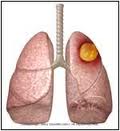Lung Abscess:
 Lung abscess refers to a localized area of suppurative necrosis within the lung parenchyma, resulting in the formation of one or more large cavities filled with pus.
Lung abscess refers to a localized area of suppurative necrosis within the lung parenchyma, resulting in the formation of one or more large cavities filled with pus.Causes Of Lung Abscess:
1. Aspiration of infective material from carious teeth, infected sinuses or tonsils particularly likely during oral surgery, anaesthesia, coma or alcoholic intoxication.
2. Aspiration of gastric contents.
3. As a complication of necrotizing bacterial pneumonia, particularly those caused by S. aureus, S. pyogenes, K. Pneumonia, P. Arigninosa and pneumococci.
4. Bronchial obstruction, particularly with bronchocarcinoma. Bronchial obstruction leads to secondary infections which may complicate to abscess formation.
5. Septic Embolism, from septic thrombophlebitis or from infective endocarditis of right side of the heart.
6. Hematogenous bacterial spread from other sites of infections. (Hematogenous means "through blood")
Signs and Symptoms:
1. Prominent cough with copious amounts of foul-smelling, purulent or sanguineous sputum.
2. Occasionally hemoptysis occurs.
3. Spiking fever
4. Malaise
5. Clubbing of fingers may occur
6. Anaemia may occur.
7. Weight loss may occur
Treatment Of lung Abscess:
Infective abscesses occur in 10% - 15% of cases with bronchogenic carcinoma; thus, when a lung abscess is suspected in an older person, underlying carcinoma must be considered. Treatment includes antibiotic therapy and, if needed, surgical drainage. Overall, the mortality rate is in the range of 10%
Visit the Home page.